Meet the Team
Perth Equine Vets / Meet the Team
Director & Equine Veterinary Surgeon: Camilla Church BVMS MRCVS CertAvp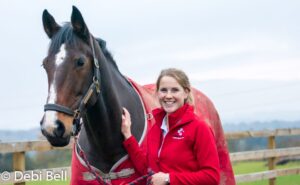
Camilla settled in Perthshire after her graduation from Glasgow Vet School in 2015. Since then, she has worked with mainly horses in mixed and small animal/equine practices. In 2020, she made the difficult but exciting decision to leave a job that she loved, and set up on her own.
Camilla has additional qualifications as a Permitted Treating Vet for the FEI, and completed a Certificate in Advanced Veterinary Practice in equine dentistry. She enjoys providing vet cover for endurance and hunter trial events.
As a mad keen Pony Clubber, horses have always been important to Camilla growing up. She passed the PC A-test in 2017 and since then has become an accredited Stage 4 professional coach with the BHS, with the Stable Managers Certificate. When not working, Camilla is kept super busy with her little baby boy Oliver, who she hopes will love horses as much as she does!
Director & Equine Veterinary Surgeon: Anna Hammond BVM&S DACVIM-LAIM Cert EM (Int Med) FHEA MRCVS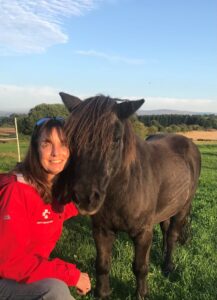
Anna grew up in Fife, graduating from Edinburgh Vet School in 1994 and immediately started a 2-year interns job in the Liphook Equine Hospital. She then headed to the Southern hemisphere working in equine referral hospitals in Australia for 2 years, and New Zealand for 2. It was during this time that she developed her love of stud medicine and after several foaling seasons she became the queen of the pony studs, never had her long, skinny arms been so useful! She returned to the UK to enter a 3 year post-graduate specialist training program at the Royal Vet College in London collecting her Certificate in Equine Internal Medicine along the way. Following this spell in academia she returned to her first love of first opinion equine practice and worked in Sussex for many years, working for several studs, seeing internal medicine cases, lots of vettings and all the routine equine work.
Family reasons forced the move to Bristol University Vet School where she spent 7 years, working both as lead vet in the first opinion practice and also working in the equine referral hospital. she is a specialist in equine internal medicine, and is a diplomate of the American College of Veterinary Internal Medicine. During her time at Bristol University she re-designed the curriculum for equine reproduction for which she was awarded a teaching prize in 2017.
Anna has presented at national and international conferences, published several papers and is currently external examiner to Nottingham Vet School final year and teaches and examines on the medicine certificate course for the University of Liverpool Vet School.
She is pictured here next to Murphy who is a pony she found in a field and subsequently rescued with the help of World Horse Welfare. In her spare time she loves spending time with her rescue ponies and running marathons.
Equine Veterinary Surgeon: Gayle Wotherspoon DVM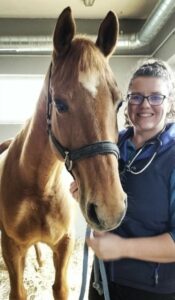
Gayle grew up near Edinburgh, with family hailing from Fife. Some of you have met her a number of years ago, as she was an absolutely stand-out student previously. She studied veterinary medicine as a second degree abroad.
She has always had a keen interest in animals, in particular horses, and has been riding since she was 3. Over the years she’s worked on livery yards with a variety of horses of all ages, shapes and sizes, from happy hackers to competition horses and ex-racers. She also worked on a farm for a few years, alongside laboratory work.
Her hobbies out with riding include hill walking and getting out with a camper van when the Scottish weather permits, and when it doesn’t she enjoys knitting in the warm indoors.
Equine Veterinary Surgeon: Katie Offer BVMS DipECEIM MRCVS
Katie graduated from Glasgow Vet School in 2016 and joined an equine practice in Derbyshire. She then went to Australia and completed a medicine internship at Scone Equine Hospital and then a medicine Fellowship at Hagyard Equine Medical Institute. At Christmas time 2024, Katie completed her residency at Glasgow Vet School and passed her European Internal Medicine Diploma (this is the European equivalent of Anna’s qualification) so she is a super smart cookie! As if this wasn’t enough, she starts a PhD in September too. We are very excited to have her working with us at PEV.

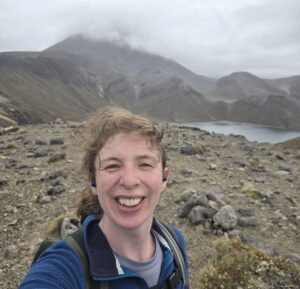
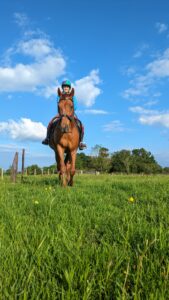
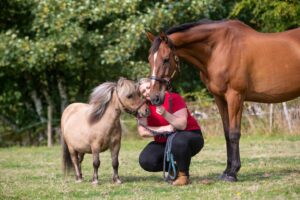 Sam is pictured with her beloved ex racer, Scoobie, who she since has sadly lost, and the cheeky little Fin. Since this picture was taken, she has significantly grown her equine collection: Finn keeps Sherby, a lovely Welsh Section A on her toes, and Donkey the ex-show jumper too.
Sam is pictured with her beloved ex racer, Scoobie, who she since has sadly lost, and the cheeky little Fin. Since this picture was taken, she has significantly grown her equine collection: Finn keeps Sherby, a lovely Welsh Section A on her toes, and Donkey the ex-show jumper too.
Sam is also a trained hairdresser, so the team have already taken advantage of keeping their forelocks trimmed ![]() .
.
Admin Assistant: Alison Craig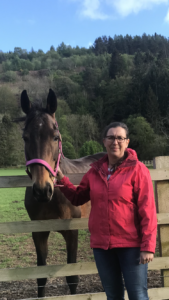
Alison has a reassuring and efficient manner, and joined the team as our admin assistant. She lives locally with her husband and two children, two dogs, 20 Cheviot sheep and lovely horses, Hope and Bracken. She is on the committee for the local Pony Club and spends lots of time ferrying Hope to rallies with her daughter!
Admin Assistant: Alison Macleod
Alison 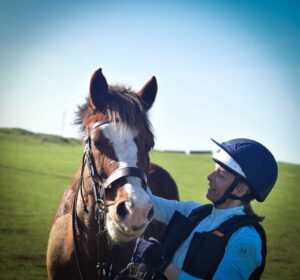 joined us in 2024, as a maternity cover for Sam, and we are delighted to say she is now part of the team permanently.
joined us in 2024, as a maternity cover for Sam, and we are delighted to say she is now part of the team permanently.
She has many years experience working within in an office environment and like the rest of us, has a wealth of equine experience also so makes the perfect combination for our ever growing team :-).
Alison lives in locally with her husband and teenage son and is also horsey mum to the beautiful Irish Draught x, Indi and cheeky Welshy, Rocco.
We are sure you will find her patient manner and caring approach to your horses care just as fabulous as we do!
Admin & Clinical Assistant: Maddy Attridge
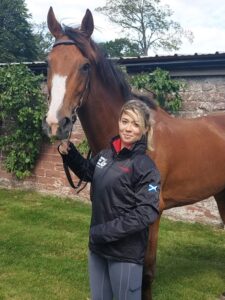 Maddy has joined the office team, and will also be seen out on yards, helping the vets with procedures. She is pictured here with a Grand National winner that you might all recognise! She has worked in a dental practice previously, is a veterinary physiotherapist and has worked as a groom in racing.
Maddy has joined the office team, and will also be seen out on yards, helping the vets with procedures. She is pictured here with a Grand National winner that you might all recognise! She has worked in a dental practice previously, is a veterinary physiotherapist and has worked as a groom in racing.
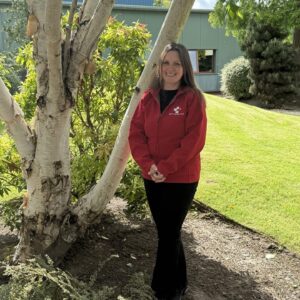
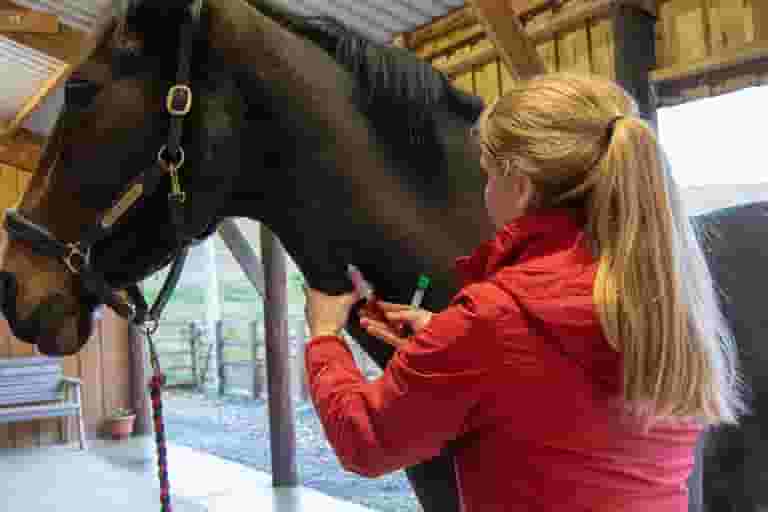
It is recommended that all horses are vaccinated, whether they go out competing or not. All horses can succumb to the fatal disease, Tetanus (lock jaw), which is preventable by a vaccination every 2 years.
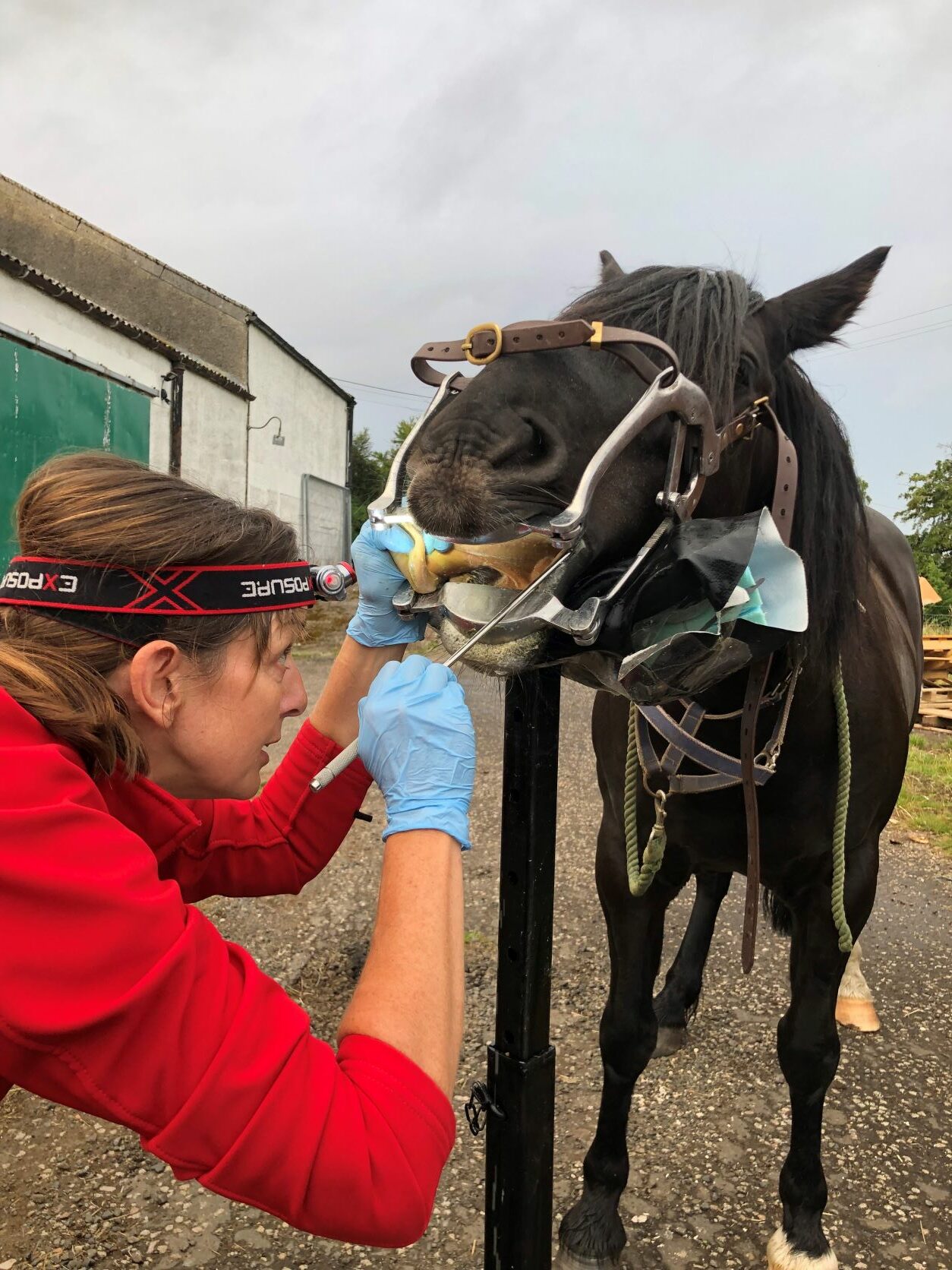
Dental examinations are a vital part of the veterinary preventative healthcare for your horse. It is recommended that all horses have their teeth checked at least every 6 to 12 months in order to prevent problems building up and causing pain.

Worming based so FWEC results is vital to prevent resistance becoming a real problem in our horse population. Blanket worming all horse regularly is no longer recommended, and should be based on FWEC results, and risk factors that make them more predisposed to have a higher worm burden.